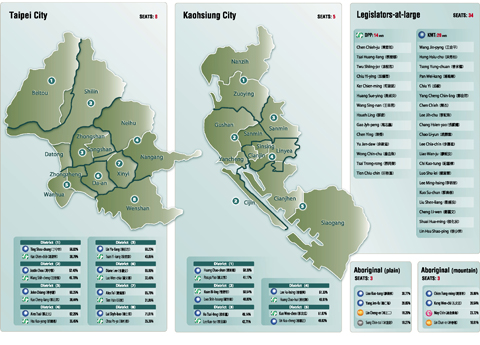Unofficial observers from overseas praised the calm atmosphere and efficiency of yesterday's elections, although some commented on the low turnout rate among younger voters.
Member of the European Parliament for Hamburg Georg Jarzembowski, who came to Taiwan to observe the election, said the smooth way in which the voting process proceeded was an indication of the maturity of the nation's democracy.
"We did not notice anything out of the ordinary. Everything went as the polls have suggested," Jarzembowski said.

The election results signify that voters are dissatisfied with the incumbent government and are yearning for a fresh beginning to revive the economy, he said.
Jarzembowski, who heads the European Parliament's Taiwan Friendship Group, said he did not observe any misconduct at any of the polling stations he surveyed yesterday.
"The voters behaved just as we expected, orderly and enthusiastic," he said.
Jarzembowski said he was happy to see the candidates -- both winners and losers -- behave in a gracious manner.
Sebastian Dreyer, Taiwan Friendship Group secretary-general said the candidates had probably been on their best behavior because they knew their conduct in this election could influence the result of the presidential election in March.
Christopher Hughes, a professor of international relations at the London School of Economics, said the calmness of yesterday's elections was a "good thing, because in the past elections have been too emotional."
Hughes attended several election rallies and said groups of party supporters were relatively calm, even when rallies of opposing parties took place next to each other.
Gudrun Wacker, head of the Research Unit Asia from the German Institute for International and Security Affairs, said candidates' campaign platforms, especially in southern counties, were mostly localized and had concentrated on developing the region's economy.
Some graduate students from Johns Hopkins University's School of Advanced International Studies (SAIS) said there was a very low turnout among younger voters.
They said some students might have found it difficult to travel all the way home to vote.
One student, Christina Lin, said she was concerned to see a lack of involvement among young voters.
"Some of the students that I talked to did not plan to vote," SAIS student Andrew Publicover said.
The SAIS students said they were able to attend various election events and talk to candidates about their policies.
They said the trip helped them gain a better understanding of Taiwan's political climate, especially on the issue of national identity, cross-strait relations and the role of the US in China-Taiwan relations.

Chinese spouse and influencer Guan Guan’s (關關) residency permit has been revoked for repeatedly posting pro-China videos that threaten national security, the National Immigration Agency confirmed today. Guan Guan has said many controversial statements in her videos posted to Douyin (抖音), including “the red flag will soon be painted all over Taiwan” and “Taiwan is an inseparable part of China,” and expressing hope for expedited reunification. The agency last year received multiple reports alleging that Guan Guan had advocated for armed reunification. After verifying the reports, the agency last month issued a notice requiring her to appear and explain her actions. Guan

GIVE AND TAKE: Blood demand continues to rise each year, while fewer young donors are available due to the nation’s falling birthrate, a doctor said Blood donors can redeem points earned from donations to obtain limited edition Formosan black bear travel mugs, the Kaohsiung Blood Center said yesterday, as it announced a goal of stocking 20,000 units of blood prior to the Lunar New Year. The last month of the lunar year is National Blood Donation Month, when local centers seek to stockpile blood for use during the Lunar New Year holiday. The blood demand in southern Taiwan — including Tainan and Kaohsiung, as well as Chiayi, Pingtung, Penghu and Taitung counties — is about 2,000 units per day, the center said. The donation campaign aims to boost

The Kaohsiung Tourism Bureau audited six hotels in an effort to prevent price gouging ahead of Korean band BTS’ concert tour in the city scheduled for Nov. 19, 21 and 22 this year. The bureau on Friday said that the audits — conducted in response to allegations of unfair pricing posted on social media — found no wrongdoing. These establishments included the local branches of Chateau de Chine, Hotel Nikko, My Humble House, and Grand Hai Lai, it said, adding that the Consumer Protection Commission would have penalized price gougers had the accusations been substantiated. The bureau said the Tourism Development Act

The Central Weather Administration (CWA) said a magnitude 4.9 earthquake that struck off the coast of eastern Taiwan yesterday was an independent event and part of a stress-adjustment process. The earthquake occurred at 4:47pm, with its epicenter at sea about 45.4km south of Yilan County Hall at a depth of 5.9km, the CWA said. The quake's intensity, which gauges the actual effects of a temblor, was highest in several townships in Yilan and neighboring Hualien County, where it measured 4 on Taiwan's seven-tier intensity scale, the CWA said. Lin Po-yu (林柏佑), a division chief at the CWA's Seismological Center, told a news conference